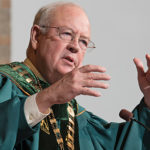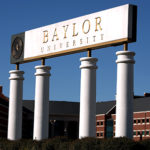Posted: 9/19/03
Baylor board meets
behind closed doors for business
By Mark Wingfield
Managing Editor
WACO–At the Sept. 12 news conference where Baylor University regents Chairman Drayton McLane announced the board's strong support for President Robert Sloan, he was flanked by 34 of his fellow regents, many of whom stayed afterward to talk with reporters.
That was a change from previous regents' meetings, where only McLane was authorized to speak to reporters and regents who broke that mandate were chastized. This time, even regents who dissented with the majority vote favoring Sloan were given freedom to tell their side of the story.
One other factor did not change, however. The entire regents' meeting, which started at 8 a.m. and ran until about 1 p.m., was conducted behind closed doors. Media representatives and other observers waited in a classroom on the first floor of Cashion Academic Center, while the regents met in an undisclosed location.
While personnel matters, namely Sloan's performance as president, reportedly dominated the meeting, the board also dealt with more routine business. According to university news releases, the board raised tuition, approved a new degree program and received a report from an internal auditor on alleged conflicts of interest on the board.
None of that business was conducted in open session.
In contrast, the committees and Executive Board of the Baptist General Convention of Texas generally operate in open session, except for personnel matters. Likewise, trustees of the Southern Baptist Convention's seminaries and mission boards also conduct most of their business in open session.
Public universities, such as Texas A&M or the University of Texas, are required by law to conduct board meetings in the open.
Three days prior to the Baylor board meeting, President Sloan criticized Baylor's Faculty Senate for meeting in closed session to take a vote of no confidence in his administration.
“I think they should be more open about their processes. … I think they should be challenged to have open meetings,” he told reporters. “I think it's very important that the sun shine in on all of what they do. So again, openness is very important on the part of the faculty, on the part of the staff, on the part of the entire Baylor family.”
A reporter then asked Sloan if he would advocate the same openness for the board of regents and for release of key governing documents, such as the bylaws, that the university's general counsel has declared confidential.
He responded: “Some of the documents are by policy confidentially held. Baylor University conducts its meetings, the overwhelming bulk of our meetings are not done in executive session. … I suspect newspaper boards and magazine boards and corporate boards for television also have executive sessions. That's important in any institution's life. … I think we have a very open process.”
Asked again if he thought the Faculty Senate should be held to a higher standard of openness than the board of regents, Sloan said: “They should abide by standards at least as high. … I think our board has a very positive record of openness and disclosure in the whole universe of private institutions.”
The same week, the Baptist Standard sought a copy of the university's policy on conflicts of interest for regents. The university's general counsel would not allow that policy to be released publicly, however.
After an inquiry from the Standard and publication of an online article describing the refusal to release the document, Baylor spokesman Larry Brumley provided a copy of the five-page policy to the Standard. It was released with a requirement that the Standard not share it with any other media outlets.
This summer, as regents conducted an investigation of one of their members on charges of wrongdoing, the Standard and other media outlets sought copies of the university's bylaws to ascertain what procedure would be followed. The university refused to disclose its basic governing document, calling it a privileged document.
The Standard finally obtained one paragraph from the bylaws, again with the admonition that the paragraph could not be shared with any other media outlets.
Likewise, when the Standard earlier reported on the Baylor administration's statement that the university had completed its prior fiscal year with a financial surplus, the supporting data could not be found in the university's published audit. The data to show that surplus, the Standard was told, appeared only in the university's internal “operating budget,” which is a confidential report.














We seek to connect God’s story and God’s people around the world. To learn more about God’s story, click here.
Send comments and feedback to Eric Black, our editor. For comments to be published, please specify “letter to the editor.” Maximum length for publication is 300 words.